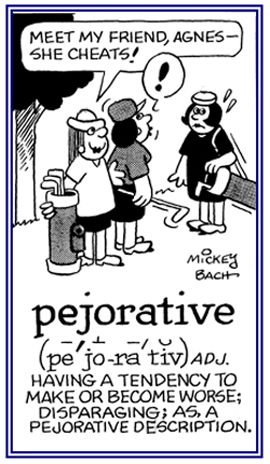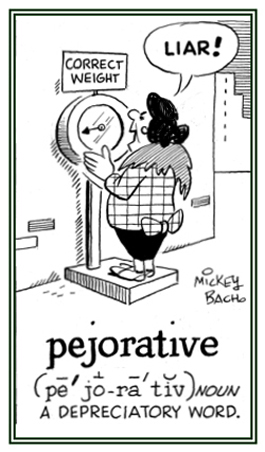You searched for:
“pejorative”
meliorative, pejorative
meliorative (MEEL yuhr uh tiv; MEE lee uh ray" tiv; MEEL yuh ray" tiv) (noun)
That which is made more tolerable; something that has been softened: Instead of returning a critical comment from a colleague, Melinda chose to be more meliorative and it resulted in a more desirable conclusion to their discussion.
pejorative (pi JOR uh tiv) (noun)
Tending to make worse; derisive, derisory, demeaning, disparaging, derogatory; uncomplimentary: When Alisa used the pejorative "you're an idiot" with the young man, and although James was tempted to send stronger pejoratives back to her, much to his credit, he resisted the temptation.
If people are incapable of being meliorative with their bosses and choose to tell their employers that their ideas are "stupid", such actions would no doubt be considered pejorative and the result would very likely be unemployment for them.
This entry is located in the following units:
Confusing Words Clarified: Group M; Homonyms, Homophones, Homographs, Synonyms, Polysemes, etc. +
(page 3)
melior-, meliorat-
(page 1)
pejorative (pi JOR uh tiv) (adjective), more pejorative, most pejorative
A reference of disapproval or scorn about someone or something: Many people use the pejorative term “weed" for a plant that they don’t like and pull out of their gardens, regarding them as unwanted.

© ALL rights are reserved.
Go to this Word A Day Revisited Index

Go to this Word A Day Revisited Index
so you can see more of Mickey Bach's cartoons.
An expression that someone or something is contemptible, derisive, or demeaning: A pejorative is a disparaging and derogatory term; such as, “cop” for a police officer or "idiot" when someone disagrees with the statements being made by a speaker.

© ALL rights are reserved.
Go to this Word A Day Revisited Index

Go to this Word A Day Revisited Index
so you can see more of Mickey Bach's cartoons.
(a suffix which forms nouns that refer to people who regularly engage in some activity, or who are characterized in a certain way, as indicated by the stem or root of the word; originally, which appeared in Middle English in words from Old French where it expressed an intensive degree or with a pejorative or disparaging application)
